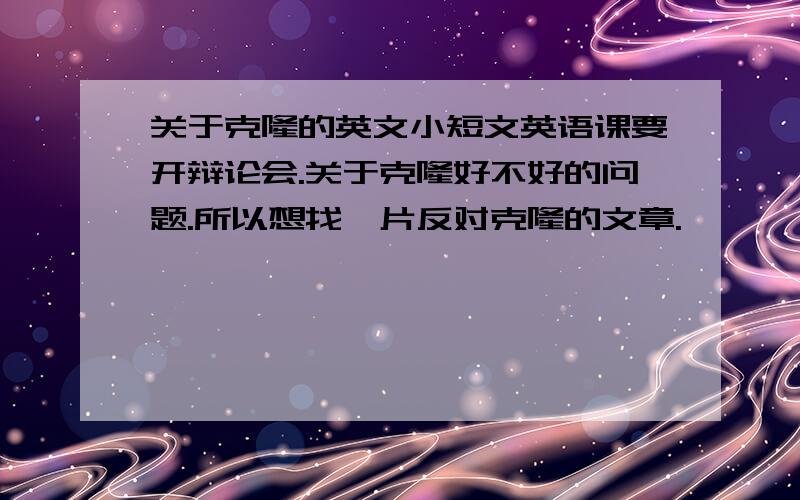关于克隆的英文小短文英语课要开辩论会.关于克隆好不好的问题.所以想找一片反对克隆的文章.
来源:学生作业帮助网 编辑:作业帮 时间:2024/11/06 01:47:20

关于克隆的英文小短文英语课要开辩论会.关于克隆好不好的问题.所以想找一片反对克隆的文章.
关于克隆的英文小短文
英语课要开辩论会.关于克隆好不好的问题.
所以想找一片反对克隆的文章.
关于克隆的英文小短文英语课要开辩论会.关于克隆好不好的问题.所以想找一片反对克隆的文章.
Cloning may reduce genetic variability, Producing many clones runs the risk of creating a population that is entirely the same. This population would be susceptible to the same diseases, and one disease could devastate the entire population. One can easily picture humans being wiped out be a single virus, however, less drastic, but more probable events could occur from a lack of genetic diversity. For example, if a large percentage of an nation's cattle are identical clones, a virus, such as a particular strain of mad cow disease, could effect the entire population. The result could be catastrophic food shortages in that nation.
Cloning may cause people to settle for the best existing animals, not allowing for improvement of the species. In this way, cloning could potentially interfere with natural evolution.
Cloning is currently an expensive process. Cloning requires large amounts of money and biological expertise. Ian Wilmut and his associates required 277 tries before producing Dolly. A new cloning technique has recently been developed which is far more reliable. However, even this technique has 2-3% success rate.
There is a risk of disease transfer between transgenic animals and the animal from which the transgenes were derived. If an animal producing drugs in its milk becomes infected by a virus, the animal may transmit the virus to a patient using the drug.
Any research into human cloning would eventually need to be tested on human. The ability to clone humans may lead to the genetic tailoring of offspring. The heart of the cloning debate is concerned with the genetic manipulation of a human embryo before it begins development. It is conceivable that scientists could alter a baby's genetic code to give the individual a certain color of eyes or genetic resistance to certain diseases. This is viewed as inappropriate tampering with "Mother Nature" by many ethicists.
Because clones are derived from an existing adult cell, it has older genes. Will the clone's life expectancy be shorter because of this? Despite this concern, so far, all clones have appeared to be perfectly normal creatures.
A "genetic screening test" could be used to eliminate zygotes of a particular gender, without requiring a later abortion.
Cloning might be used to create a "perfect human," or one with above normal strength and sub-normal intelligence, a genetic underclass. Also, if cloning is perfected in humans, there would be no genetic need for men.
Cloning might have a detrimental effect on familial relationships. A child born from an adult DNA cloning of his father could be considered a delayed identical twin of one of his parents. It is unknown as to how a human might react if he or she knew he or she was an exact duplicate of an older individual.